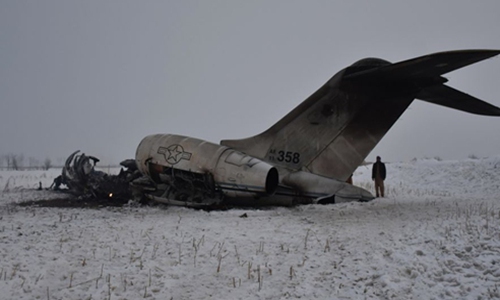HOME >> OPINION
US withdraws from anti-terrorism front with Taliban peace deal
By Zhang Yifei Source:Global Times Published: 2020/2/28 15:18:40

Photo taken on January 27 shows the wreckage of the crashed plane in Deh Yak district of Ghazni province, Afghanistan. The Afghan Taliban claimed that its fighters shot down a U.S. forces' aircraft in eastern Ghazni province. Photo: Xinhua
Since the US launched its war in Afghanistan targeting Al Qaeda and the Taliban, it has been on a bumpy road toward a truce, and has failed to pull itself out from the battlefield. There have been favorable turns for the US since the Trump administration and the Taliban agreed to a "nationwide reduction in violence across Afghanistan," which may even lead to a peace deal between the two sides on Saturday. If the peace deal is signed, the longest war in US history will come to an end.
The US military operations in Afghanistan have to some extent dealt a blow to local terrorist groups, contained terrorism in the Middle East, and prevented its spread eastward. However, it remains unclear if the US war in Afghanistan came anywhere close to achieving it strategic goals.
Although the Taliban regime was pushed out of power, the US hasn't succeeded in ending the domestic divisions in Afghanistan. While both the Afghan government and the Taliban have become less aggressive in recent years, the country still faces a high risk of civil war.
While the strength of Al Qaeda has been diminished, the US has failed to root out terrorism in Afghanistan. The weakening of certain terrorist groups doesn't mean terrorism is no longer a threat. A combination of religious extremism and social problems, including poverty and a lack of education, have created a cradle for terrorism. During the war, Afghanistan's economic construction and religious affairs have failed to make progress.
The US declared war against terrorism in 2001, and attempted to define friends and enemies by their stance on terrorism. This has helped the US gain international status as the leader of anti-terrorism. Yet the US has failed to uphold justice in other areas. In the recent years, Washington has repeatedly shirked its global responsibilities, pulling out of important international organizations, and intensifying great power competition. This has rapidly consumed the reputation the US earned as a leader in combating terrorism.
By signing a peace deal with the Taliban on Saturday, the US hopes to pave the way for a troop pullout as it promises to withdraw from other conflicts, many of its own making.
Even though it continues to increase its super-sized military budget, the US is becoming less capable of supporting its military operations around the globe, including anti-terrorism missions in Central Asia and the Middle East. The Trump administration's international contraction strategy, appears aimed at gathering strength for what it sees as bigger challenges.
As the Trump administration turns its focus away from regional mid-sized countries and non-state organizations and groups, the US will also withdraw its forces from anti-terrorism battlefields and participate less in relevant international cooperation, shrinking its past efforts in the anti-terrorism sphere in favor of its new national security strategy.
The key to eradicating terrorism lies in three aspects: international military cooperation, elimination of terrorist strongholds, and de-radicalization. The international community should strike against the remaining terrorist forces and prevent them from snowballing into new groups while simultaneously countering extreme religious thinking.
The US' counter-terrorism strategy that focuses on military strikes has repeatedly proven to be flogging a dead horse. Nonetheless, if the US and the Taliban can successfully finish the seven-day "reduction in violence," they will likely create opportunity for more constructive rather than destructive counter-terrorism attempts.
As events in Central Asia receded from the focus of US military might, Washington is likely to put more effort on its rivalry with China and Russia.
The author is an assistant research fellow with the Institute of American Studies of the Chinese Academy of Social Sciences. opinion@globaltimes.com.cn
Posted in: VIEWPOINT